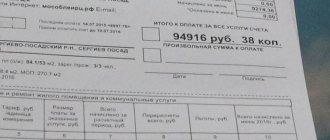Moscow, 09.09.2020, 09:05:38, editorial office of FTimes.ru, author Zoya Zharkova.
The difficult situation due to the coronavirus has led to thousands of Russians being unemployed, so the main issue on the agenda is how to pay utility bills.
According to the law, a citizen is charged a penalty for non-payment or late payment of housing and communal services; they are imposed for each day of delay, starting from the 31st day following the day of the due date for payment until the day of actual payment.
Procedure for paying utility bills in apartment buildings
The procedure for paying for utilities is regulated by the Housing Code. According to Article 153 of the Housing Code of the Russian Federation, this is the responsibility of every citizen, including legal entities, who rent any premises. Housing and communal services include:
- payment for hot and cold water;
- making payments for electricity (study the main provisions of Law 35 on energy supply);
- making payments for heating;
- and gas supply.
According to Article 155 of the Housing Code of the Russian Federation, there is a certain period during which utilities must be paid. Payment is made every month before the 10th day upon receipt of the corresponding payment document. Military personnel, veterans and other categories of citizens enjoy payment benefits.
The maximum delay in payment for utilities can be 31 days. Previously, penalties were accrued for a month of delay; now penalties are accrued for 31 days of failure to make payments. To use installment plans and deferments, valid reasons for delaying payment are required. These include:
- serious disease;
- loss of position or sole breadwinner.
In any of the above cases, documentary evidence of the facts will be required.
What are the consequences of non-payment of utility bills?
The new law on non-payment of utilities involves the accrual of penalties for debtors who do not pay bills on time for utilities. Federal Law No. 307 discusses the procedure for calculating penalties for non-payment. Amendments have been made to the law to increase consumer discipline.
The main methods of dealing with persistent defaulters are:
- accrual of penalties;
- imposing restrictions or suspension of utility services;
- The last resort is eviction from the apartment with the help of the court.
Let's consider the above methods of punishment for late payments carried out by utility providers later in the article.
Penalty amount according to law
The most common penalty is the accrual of penalties. A penalty is a penalty for a long delay in paying utility bills. According to federal law No. 307, citizens who are overdue for payment by more than a month will be subject to penalties. You can pay your invoice within 31 days after receiving your receipt.
The total amount of the penalty depends on the size of the debt and the number of days of non-payment, as well as the refinancing rate of the Central Bank of Russia.
Rent debtors who are individuals should remember that from 31 days to 90 days, 1/300 of the refinancing rate is charged for each day the receipt is not paid. And from 91 days the penalty will increase to 1/130 of the Bank of Russia rate. Currently the rate is 9%.
The legal status of the utility consumer affects the calculation of late fees. For organizations supplying heating, water, etc., the fine will be charged as follows:
- from 1st to 60th day - 1/300 of the Central Bank interest rate;
- from 60 - 90 - 1/170;
- from 91 days - 1/130 of the interest rate.
For legal entities, the fine will be charged at the maximum discount rate - 1/130. If the debt for an apartment can be paid through the terminal, then there is no penalty. Payment can only be made at a Sberbank branch or at a management company, which should be done as soon as possible.
The accrual of penalties can be avoided if the citizen has to leave for another city for a long period. The interested party is obliged to write a statement to the management company and notify about this fact. The deferred payment will be valid for six months. If an extension is required, the next application is sent by mail.
What are suppliers entitled to?
In addition to charging penalties, utility service providers have the right to resort to other measures to punish debtors. For late payment of more than 3 months, the supply of gas, electricity, water will be disconnected or limited for non-payment of utilities. The supplier has the right to act in accordance with these regulations until funds are received from the debtor. Notification of the defaulter is made in writing by mail. After 3 days, if the notification is ignored, the notification is made personally by an authorized person.
Eviction from an apartment for debt is also possible. However, it applies to citizens who rent living space. to evict the owner from a privatized apartment. The impetus for this procedure is not the total amount of debt, but the time period of non-payment of utility bills - more than 6 months.
The Ministry of Construction proposed to introduce a new procedure for collecting debts for housing and communal services
The volume of debt for housing and communal services now reaches almost 1.3 trillion rubles. Of these, the population’s debts amount to 570 billion rubles, as calculated for RG by the Ministry of Construction.
According to Rosstat in the fall of 2020, residents owed 282 billion rubles to management companies, homeowners' associations and housing cooperatives. The population underpaid 139 billion of them in the column “maintenance of living quarters”, 14 billion for cold and 25 billion for hot water, and another 14 billion for sewerage. Residents owe 53 billion rubles for heating, 11 billion for electricity and 0.7 billion for gas. Another 290 billion rubles are owed for utilities by citizens who have direct contracts with suppliers. Of these, 50 billion rubles are debts for water and sewerage, 125 billion are to heat supply organizations. The population owes 55 billion for electricity, 44 billion for gas and 14 billion for garbage collection. In general, as noted in the Ministry of Construction, the amount of debt in recent years has remained approximately at the same level.
From April 1, rules will come into force according to which the so-called identifier of the defendant must be indicated in the statement of claim to the court. This could be his passport details, driver’s license number, TIN, SNILS, etc. This procedure will avoid debt collection, for example, from the debtor’s namesake. However, these innovations may paralyze the collection of debts for housing and communal services. As the State Duma Committee on Housing Policy noted, the principle of mandatory conclusion of contracts with residents has not been established for housing and communal services organizations. The legislation does not provide for procedures for management companies or suppliers of water, heat and gas to obtain such information from residents. Because of this, the introduction of the rule on indicating identifiers, which was originally supposed to come into force last fall, was postponed for six months.
The Ministry of Construction is currently considering options for solving this problem. The agency sent a proposal to the government to amend the legislation and exempt housing and communal services organizations from the obligation to indicate the identifiers of the defendant if the organizations do not have such information. As the press service of the Ministry of Construction reported to RG, it is also being discussed that management companies and resource supply organizations will be able to obtain information about consumers through the GIS housing and communal services - the system will organize the identification of citizens through unique unified personal accounts.
The population's debt for housing and communal services reaches 570 billion rubles
According to Deputy Minister of Construction and Housing and Communal Services Maxim Egorov, now residents are not sufficiently motivated to pay housing and communal services on time, says Egorov. Management companies and service providers need to step up efforts to collect debt for utility services. “Now there are more and more accessible and convenient ways to pay for housing and communal services - from personal accounts to auto payments,” notes Egorov.
Due to the convenience of payment, the ministry expects an increase in payment discipline. Now 95-98 percent of residents pay utility bills on time.
The Ministry of Construction reminds that there are ways to peacefully resolve debt repayment issues. Management organizations may offer to restructure the debt through a commission to resolve the situation. You can, for example, enter into an agreement with the management company to repay the debt in installments without interest. More stringent measures are applied to persistent defaulters - debt collection through court, seizure of property and restriction of travel abroad. In extreme cases, utility supplies may be limited. A set of measures to improve payment discipline will be included in the Development Strategy of the housing and communal services sector of the Russian Federation until 2035, says Egorov.
Where can I complain about illegal shutdowns?
The Federal Law on Rent provides for utilities that do not have the right to be turned off, even if payment is not received - heating and cold water supply.
Disabling any type of utility service without proper warning from suppliers is illegal! This unlawful action can be appealed. The complaint can be sent to the management company or the HOA. If mutual agreement cannot be reached, the claim is sent to the state housing inspectorate or Rospotrebnadzor. This is followed by filing a written application with the prosecutor's office and the court.
Utility providers may be subject to administrative and criminal liability. For violation of the regime for providing the population, housing and communal services impose a fine on officials - 500 - 1,000 rubles, and on legal entities - 5,000 - 10,000 rubles. For arbitrariness and causing damage - a fine of up to 80,000 rubles is charged, or compulsory labor of 180 - 240 hours is carried out, or correctional labor from 1 - 2 years, or arrest for 3 - 6 months.
Arrears in payment could be the reason for disconnection of utility services. If the debtor received the notice on time and the fact of late payment is recognized by him, then the only solution to the problem is the payment of funds. When the debt is repaid, electricity, gas, and water are supplied within two days.
Increases in the cost of provided utility services are carried out with enviable regularity and sometimes consumers do not even have time to physically track these increases in prices, let alone income, which cannot always cover even the most basic services. It is not surprising that as tariffs increase each year, the total debt and the number of people behind it grows. To deal with non-payers, the country has a certain legal mechanism that implies liability for non-payment of utility services. It is he who reflects what threatens in 2020 for non-payment of utility bills.
Liability for non-payment
Tightening of liability for ignoring the requirements of the housing code to pay rent occurred with the advent of 2016. Then, in two readings, a bill was adopted that would increase the size of penalties and tighten other enforcement measures.
Liability, it should be noted, applies only to civil law and to all users of the service, who are tenants or owners of a particular residential premises, jointly and severally. Criminal or administrative sanctions are not provided, since, from the point of view of legal doctrine, such actions do not constitute an offense or crime.
Thus, today service providers for non-payment of housing and communal services have the right to apply the following consequences to the culprits in 2020 if a debt is incurred for services provided:
- Restriction of utility services for non-payment. This measure is implemented in different ways, it all depends on the Criminal Code. Thus, they can set a limit, for example, on the consumption of a resource during a day in a certain amount, and as soon as this indicator is reached, the service is automatically disabled. An alternative would be to restrict access to the resource, i.e. the supply will be carried out in a much smaller volume. Regardless of the chosen type of implementation of the measure, it is required to go through a certain legal procedure for its introduction, which consists of a written notification personally to the defaulter with a month’s period for closing the debt to the supplier. After that, 3 days before the end of the month, the notification is duplicated and, if by the appointed time the funds do not arrive in the account of the management company, then service restrictions can be established legally. For example, the daily limit on electricity supply will be set at 3 kW.
- Issue penalties and fines.
- Disable the resource if the account has not been repaid for a long time.
- To evict from the occupied residential premises by court.
Some compassionate management companies go further and resort to methods that are completely beyond the law and beyond the boundaries of what is permitted. For example, they resort to the services of collectors who are engaged in the literal sense of the word “extorting debts.”
Legal regulation
For the provision of each of the services, an agreement is concluded between the owner or tenant of the property and the supplier (management company, homeowners association, etc.), the provisions of which must comply with the norms of the current legislation, primarily the Housing Code of the Russian Federation.
Articles 153, 155 and 157 of the said act define the fundamental aspects of settlements between consumers of services and suppliers.
To some extent, legal relations are regulated by the norms of the Civil Code of the Russian Federation and a number of government regulations, including:
- No. 307 dated May 23, 2006;
- No. 549 of July 21, 2008, etc.
For non-payment, the suspension of utility services is carried out on the basis of the norms of government resolution No. 354.
What to do with a large utility debt
Therefore, you should be careful, and in this case write a statement to the court indicating this fact. This is in the interests of the debtor, because if you do not indicate the terms of collection, no one will pay attention to them. This means that the amount can increase significantly. Regardless of the size, you can always agree with the management company on the best way to deal with debts.
The law provides for a number of punitive measures for the debtor, the basis of which is the Housing Code of the Russian Federation. According to it, every owner or tenant of housing is obliged to pay utility bills on time. If you have a debt for an apartment, we will discuss what to do in this situation further.
Accrual of penalties
The accrual of penalties is differentiated according to several criteria: by category of the defaulter and by the duration of non-payment. Thus, business entities that do not seek to pay for electricity, water and other benefits of civilization begin to accrue penalties from the first day of delay daily in the amount of 1/130 of the refinancing rate of the Central Bank of the Russian Federation.
Punishment in the form of penalties for unpaid utility bills is applied to citizens from the second month of delay. Moreover, until the fifth month (up to 90 days), their daily amount is 1/300 of the refinancing rate, then the same coefficient applies as for business entities. This is provided for by relatively new changes in 2020; previously, the amount of the penalty was fixed throughout the entire period of debt accumulation.
Disabling the use of utilities
As soon as a debt accumulates to pay for the provided housing and communal services, the supplier organization is authorized to disconnect. This right is enshrined in government decree No. 307 of May 23, 2006. You first need to go through a certain procedure so that everything is legal and legal, and the user has time to come to his senses and take measures to resolve the issue.
So, on the eve of disconnection for non-payment of utilities, no later than a month in advance, the management company, homeowners association, etc. must notify in writing about the accumulated debt, the need to repay it and the consequences of ignoring this obligation within the time limits specified in the letter itself.
If the time provided for payment runs out, then two days before the actual disconnection, another written notice that the service will be disconnected must be delivered against signature.
The supply of the resource can be resumed two days after full payment. In this case, the careless user of the services will have to pay for the restoration work from his own wallet. This is because stopping the supply of electricity, blocking the sewer system, etc. entails forced damage to the equipment.
The supplier will make concessions and waive payment for restoration work if there are some valid reasons, for example, the user is disabled or is in dire financial straits.
There are types of resources, the disconnection or suspension of the provision of which is prohibited by law, no matter how much debt has accumulated. These include heating and cold water supply.
As for the termination of gas supply, government decree No. 549 of July 21, 2008 gives the supplier the right to disconnect the service if the payment is overdue for three months or more.
Homeowners' associations, management companies, etc., in practice, are in no hurry to use such radical influence. Usually, debtors are influenced for a long time by other available measures, persuasion, explanatory work, and limiting unpaid services. And only if there is no other way out, and all previously taken measures did not give the desired result, a shutdown should occur.
Submitting a debt collection case to court
The failure of all measures taken in the event of prolonged non-payment of rent can lead to the most serious consequences. In particular, it gives utility companies the right to seek judicial protection by filing a claim for debt collection. First, you need to reliably verify and collect the appropriate package of documents that the consumer has stopped fulfilling the obligation to pay for services (notifications of debt, impending disconnection, etc.).
The latest legislative changes dated January 1, 2016, which tightened measures against debtors, made judicial review faster and simpler. The process lasts no more than 5 days from the date on which the application was submitted, and at the end there is a positive decision in favor of the plaintiff in the form of a ruling on a court order, which is issued in absentia (i.e., without the presence of the debtor). Such a resolution of the situation will cost the defaulter more, since legal costs and state fees will be added to penalties, fines, and the amount of debt.
A court decision, after entering into force, can be implemented in two different ways. It all depends on the situation and the attitude of the losing party to the order issued.
First, a voluntary procedure is provided. When the debtor tenant is asked to make payments in the amounts determined by the court, or is asked to carry out a restructuring, a corresponding agreement is concluded (the debtor can, even before the court and radical measures, ask the energy supply organization for an installment plan, deferment, etc.).
If the tenant does not draw conclusions and does not make contact and ignores the will of the court, he should contact the bailiff service. The contractor will initiate appropriate proceedings and, guided by the instructions, will forcibly collect funds.
If the debtor works, then part of the salary will be withheld by the accounting department at the place of employment and transferred to the account of the claimant. If necessary, property can be seized and sold at auction. The proceeds will be used to pay the plaintiff, and whatever remains will be transferred to the defaulter. Before payment, the debtor may be restricted from traveling outside the Russian Federation, etc.
In exceptional cases, long-term arrears may result in eviction. Theoretically, this is possible, but the practice of courts considering cases of this category shows that everything is not so simple. The state does not want to produce citizens without a fixed place of residence and has provided a number of restrictions that do not allow eviction for utility debts.
Thus, the owner of one apartment (privatization or another method of obtaining such a right does not matter) can be deprived of it only if it acts as a mortgage collateral. In general, if a person owns no more residential properties other than one apartment, he cannot lose it.
“Malicious” debtor-tenants are also not subject to eviction. Him municipality or other government. the authority is obliged to provide housing with 6 square meters for each family member of the evicted person. In this case, it is necessary to establish a number of circumstances, in particular, that there are no compelling reasons for evading payment, etc., and there are no mitigating circumstances.
Can I sue for housing and utility debt if I pay off the debt to the best of my ability?
Most likely, the creditor will receive a court order for the amount of the debt and submit it for collection through enforcement proceedings. Next, the FSSP will seize your accounts, property, foreclose on your salary (other income), etc... This is the saddest option.
Hello! I have rent arrears as of September 1, 2016. in the amount of 11,029 rubles. I pay rent every month + 1300 I pay off the outstanding debt. 09/20/2016 paid 3313 rubles (2366.29 sq. fee + 947 debt). Today I received a warning about overdue debt and the need to repay the debt within 3 days. I can’t pay the entire amount at once, because... I pay two loans, my salary is small - 12,200. What does this threaten me with? And can they sue me?
We recommend reading: Dina Kaminskaya's lawyer's notes
Limitation period for utility debts
Cases regarding the collection of overdue utility bills are considered by magistrates and have a general statute of limitations. This means that if the management company wants to collect the entire amount of the debt, it must apply within 3 years from the date of its occurrence. Skipping the statute of limitations will give you the right to claim a refund of the amount that has accumulated over the 3 years preceding the application to court.
Eviction for housing and communal services debts will be discussed in the video:
Attention! Due to recent changes in legislation, the legal information in this article may be out of date!
Our lawyer can advise you free of charge - write your question in the form below:
It often happens that a person, for one reason or another, cannot pay housing and communal services on time and develops a debt. In this regard, the question arises whether criminal or administrative liability may be faced for failure to pay utility bills in 2020.
What threatens a large debt for an apartment and what to do about it
- The debtor is notified in writing of future eviction from the apartment.
- Next, a lawsuit is filed in court for forced eviction.
- After a court decision on eviction, the debtor will be given 7 days to voluntarily leave, and then compulsory measures will be applied.
- Contact the housing office at your place of residence, where you will be informed of the amount of debt and accrued fines, if any. The disadvantage of this method is often the huge queues.
- If you don’t have much time or don’t want to stand in long lines, you can find out information using the Internet. To do this, you need to go to the management company’s website, register using a phone number and log into your personal account (here you will need to enter your personal account number).
- Today, many banks provide the opportunity to pay online for electricity, for water, as well as for gas and electricity supply services and, of course, heating. On their website, after completing a short registration, you can not only find out the amount of debt, but also pay it instantly.
We recommend reading: What is the Timeframe for Transferring Financial Assistance from Regional Maternity Capital?
Payment for housing and communal services
Dear readers! The article talks about typical ways to resolve legal issues, but each case is individual. If you want to find out how to solve your particular problem , contact a consultant:
+7 (Saint Petersburg)
APPLICATIONS AND CALLS ARE ACCEPTED 24/7 and 7 days a week.
It's fast and FREE !
Electricity, gas, water, heat do not enter the house just like that. Various organizations supply them. The action is not performed for free. To live in comfort, a person must pay a certain amount monthly as payment for housing and communal services.
The process is carried out strictly in accordance with the norms of current legislation. Cooperation is carried out on the basis of an agreement. The agreement is concluded between the residents of the house and the management company.
The document regulates all the features of cooperation between the parties to the transaction. All claims against each other can be made only in case of failure to comply with the provisions of the agreement.
What are the consequences of debt for an apartment in 2020?
Payment for housing and communal services and housing use is often not made on time. This provokes the accumulation of large debt, which leads to various negative consequences. However, not everyone knows exactly what scale the consequences of non-payment will become.
If the housing is municipally or state-owned, then the tenant can easily be evicted for non-payment. However, with your own real estate the situation is more complicated. Eviction is a rather rare and difficult procedure to implement. This is only possible if the judgment is not enforced by the debtor and the utility company files a second lawsuit with a specific request for eviction.
What is the penalty for non-payment of utility bills?
If a citizen falls into the category of defaulters, he will face punishment. The measures that will be taken to influence the offender are determined on an individual basis. First of all, penalties will begin to accrue.
If the debt is too large, an application may be filed with the court and forced collection may be carried out. In rare cases, eviction is possible. However, in this situation, the person will be required to be provided with alternative housing, but of a smaller area. The difference in cost will be used to cover the debt.
Citizens are required to notify about the emerging debt. For this purpose, a corresponding notification is sent. The document indicates the consequences that may result from ignoring the payment request.
In a privatized apartment
The obligation to pay utility bills arises after a person has the right to housing. It doesn’t matter whether he is the owner or the tenant. However, in the latter case, the payment process depends on the agreement with the owner.
Is it possible to legally pay rent in installments?
To pay for utilities separately from other tenants or owners, you will need to submit a corresponding application to a single settlement center. In this case, you will need to first prepare your own civil passport, as well as documents confirming ownership of the specified property.
Many people simply give up, refusing to constantly monitor their own debt and control its size, although in fact it is categorically not recommended to do so. Some penalties provided for non-payment of utility bills depend precisely on the period of time over which a person refuses to make monthly payments.
We recommend reading: Request for Familiarization with the Materials of Enforcement Proceedings
How long can you not pay?
It is better not to delay making payments for utilities. The application of penalties begins immediately after the delay. However, serious consequences usually arise after six months of ignoring the debt.
However, the amount due will increase significantly each month. In order to avoid going to court, a person will have to pay off the debt in one payment, which significantly increases the burden on the budget.
It is recommended to take action immediately after receiving a document demanding payment of the debt.
However, in practice, such paper can be obtained by mistake. If this happens, you must immediately contact the management company. You must have receipts with you confirming timely payment for services.
If a person cannot repay the debt within the specified period, there is no need to hide from the employees of the management company. It is much more profitable in this situation to make contact.
Representatives of the organization can meet the citizen halfway and conclude an agreement with him on debt restructuring.
Collection methods
Today there are several ways to collect debt. First of all, they will try to come to an agreement with the person and offer him to make the payment himself. If the action does not produce results, an appeal is made to the court. In this case, the debt will be collected forcibly.
Accrual of penalties
Penalties will be charged for late deposits. The action is carried out if a person does not pay for more than 31 days. The rule is enshrined in Art. 155 Housing Code of the Russian Federation.
The amount of the penalty will be:
- 1/300 of the refinancing rate of the Central Bank of the Russian Federation from 2 to 3 months;
- 1/130 for subsequent months.
Disabling services
To encourage a citizen to make a payment, the management company may suspend the provision of a service that has not been paid for. The measure is not applied immediately. A similar impact occurs if a person does not pay for more than 3 months. However, the measure may not apply to all services. Thus, the law does not allow turning off heating and cold water.
After the citizen has paid the required amount, the supply of the service must be resumed within 2 days.
Is eviction possible?
Long-term late payments can result in eviction. The action is performed in a situation where the management company went to court and a person’s property was seized. Subsequently, the items may be confiscated and sold to pay off the debt.
However, the rule does not apply if a person owns only 1 apartment. They do not have the right to confiscate the only housing.
What to do if you have nothing to pay a large debt for an apartment
- Penalties, the amount of which is calculated from the amount of debt and is accrued for each day of delay after one unpaid month.
- Restriction of housing and communal services or complete shutdown if payment is not made for more than 3 months. You must be notified in advance. Heating and cold water cannot be turned off.
- If the debtor ignores all notifications about debts, then the case goes to court.
- The court may offer an agreement or order the full amount to be paid at once.
- Collections (no more than 50% of income) from wages or pensions.
- Arrest and seizure of property;
- Restrictions on leaving the country and registration activities.
- Eviction of tenants of municipal apartments. This measure does not apply to private housing! Also, if the debtor does not pay for utilities due to deteriorating health or loss of work, eviction is not possible.
- The first, the simplest and most reliable, is to contact the Housing Office directly, where they will tell you at your address the exact amount of debt and accrued fines (penalties).
- If you don’t have time to stand in line at the housing office, there is a way to get information via the Internet. To do this, you need to go to the website of your management company and log into your personal account.
- There are also banks that provide payment services for housing and communal services. You will have to register, which will take no more than 10 minutes, and gain access to your personal account. Using this method, you can not only find out the amount, but also make payment immediately.
Judicially
An appeal to the court is carried out if it was not possible to collect the debt voluntarily. The basis for starting the proceedings is the claim of the management company. The court will study the submitted documents and make a decision. Usually the requirements of management companies are satisfied.
However, a citizen may be provided with a more convenient payment method than a one-time payment of the full amount of the debt.
How to make payments for utilities through Sberbank Online? Information here.
Who is entitled to subsidies for utility bills? Details in this article.










